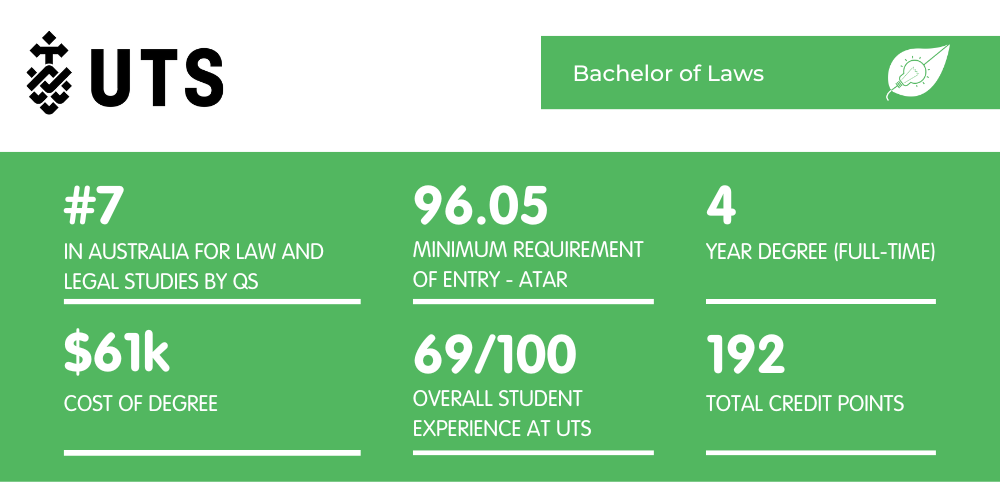Thinking about studying a Bachelor of Laws at UTS?
We’ve prepared an insightful article on everything you need to know about UTS Law, including subjects, culture, best societies to join, assessment structure and more!
Let’s dive in!
What is a Bachelor of Laws at UTS?
Core Units and Majors
How to Get into a Bachelor of Laws at UTS
What’s the Teaching Format?
What’s the Faculty and Culture Like?
What is a Bachelor of Laws at UTS?
A Bachelor of Laws at UTS is a degree which combines theoretical knowledge with a practical component to help equip students with the relevant tools to become the best lawyers in Sydney.
At UTS, there is an in-house Practical Legal Training (PLT) program which is an essential requirement for admission as a lawyer in Australia. There is also a number of combined degrees you can pair with a Bachelor of Laws including Business, Communication, Engineering, Science and others.
If you see yourself becoming a lawyer in the future, enrolling into UTS Law will give you the opportunity to tailor your degrees to areas of personal interest. Whether you are interested in environmental law, human rights law, technology, legal futures or even electives from other disciplines, UTS is extremely flexible and accommodating to all its students.
Career Paths
There are a number of career prospects from studying a Bachelor of Laws at UTS and it can be modified through the choice of your second degree as well!
For instance if you were doing Law and Communication, you could either choose to work in a legal clinic or a communication agency or use both your degrees and be an in-house lawyer at a communication agency! There are so many options, such as:
- Criminal Lawyer
- Corporate Lawyer
- Intellectual Property Lawyer
- Employment Lawyer
- Immigration Lawyer
- Bankruptcy Lawyer
- Environmental Lawyer
Just to name a few…
Learn more about a career as a lawyer here!You can also check out different types of lawyers in our article here.
Core Units and Majors
UTS Law is comprised of a number of double degrees and a single straight law degree which include Core Law subjects, Legal options and Legal Theory options.
While majors may vary depending on whether you choose to study another degree in conjunction with a Bachelor of Laws, UTS makes it extremely flexible to cater your degree to your liking and the subjects you want to choose.
Core Law Subjects
There are a number of compulsory law subjects for each UTS Law degree regardless of your other degree. Usually the subjects are extremely similar in content to those in other universities and are subjects that all lawyers have to complete to finish their degree.
Some of these subjects include:
- Foundations of Law
- Criminal Law and Procedure
- Contracts
- Torts
- Corporate Law
- Australian Constitutional Law
Legal Options
While there are many core units to complete, you are given a bit more freedom of choice with other units to study during the course of your degree. UTS Law has a variety of options here where you can either select subjects from a list of options or major in Legal Futures and Technology.
Options
There are a number of great, varied options to choose from if you are looking to diversify your degree and equip yourself in different skill sets. Some subjects include, Advanced Criminal Law, Banking Law, Disability and the Law, Environmental Law, and Media Law. You can find the list of options here.
Legal Futures and Technology
The Legal Futures and Technology major is a first in Australia and is designed to equip students with the necessary tools which will tackle the changing environment in technology and its impact on the legal field. The university has partnered with Westpac to create this program which aims to mould students into future-proof law graduates who are aware of the changes to come.
Students who choose this major will also have the chance to complete an internship at the end of their degree! For more information click here.
Legal Theory Options
With just one subject to choose from out of eleven, a Bachelor of Laws at UTS strives to provide students with a large range of options to ensure they are enjoying their degree and are choosing subjects which appeal to their interests.
Some of the Legal Theory options include:
- Animal Law and Policy in Australia
- Gender and Law
- Indigenous Peoples and the Law
- Just Tech
- Law and Literature etc.
For more info on this, click here!
How to Get into a Bachelor of Laws at UTS
The ATAR cut off for a Bachelor of Laws at UTS is an ATAR of 96.05. You can find other admission pathways here.
This includes changing from one undergraduate course to another within a year of study, the Year 12 adjustment factors, and the Jumbunna Pathway Program for undergraduate Aboriginal and Torres Strait Islander students. Remember, there is always another way!
Are there any prerequisites?
There are no prerequisites for UTS Law other than a proficiency in English.
What scholarships are available?
There are a number of scholarships available for UTS Law including some for Bachelor of Law (single degree) students, Law students (double degree), International students, Domestic students and Aboriginal or Torres Strait Islander students.
You can find this information here under Additional Information – Scholarships and Prizes.
What’s the Teaching Format?
A Bachelor of Laws at UTS is taught through lectures, tutorials and seminars through the semester-system.
At UTS the teaching format varies according to the subjects you are doing. For instance, if you are doing Introduction to Property and Commercial Law, the lecture would be 1.5 hours to 2 hours in length accompanied by a tutorial which would be for 2 hours each week.
For some subjects you may often only have seminars instead of lectures and tutorials. In these seminars, you are taught concepts and later on in the class you’ll have the opportunity to apply them.
With seminars and tutorials being more interactive (due to being smaller classes with only 20 to 35 students), you’ll have the chance to get feedback on your answers to problem questions and learn to understand arguments from different perspectives.
In lectures, you can expect to be surrounded by many more students with anywhere between 100 to 500 people attending. There isn’t as much class participation, but the theories taught are essential to know for the tutorials that follow.
How many hours do you go to uni?
UTS Law expects students based on their recommended subject structure to be taking 3-4 subjects full-time. This equates to approximately 12 to 14.5 contact hours per week and part-time students have approximately 7 to 9.5 contact hours per week. Timetable constraints may require attendance at both day and evening classes.
In addition to the contact hours, there are also a number of readings which will need to be read in preparation for seminars and tutorials for the week ahead. It is highly important to stay on track for UTS Law, and to keep yourself accountable to the various deadlines throughout the semester.
What are the assessments Like?
Assessments vary depending on each subject when studying a Bachelor of Laws at UTS, however it’s often a mixture of essays, class participation and exams. You usually get between three to four assessments per subject each semester.
Essays
Essays are generally part of the mid-semester assessment which weigh approximately 40% of the final mark.
UTS Law is quite lenient within the first two years of students’ degrees – offering more guidance, more assessments to balance the weighting and are softer in marking. However, as the degree progresses, students are expected to complete 2000 to 4000 word assignments as per the marking criteria and assessment guidelines given.
Working to tight deadlines is something you will get used to and is important as a future lawyer!
Class Participation
Class participation usually equates to only 10 to 15% of your final mark and assesses whether you are engaging with content within the weekly discussions.
As a future lawyer, it is extremely important to voice your opinions and be comfortable to discuss issues and solutions with your colleagues. It is for this reason that UTS Law has a strong emphasis on encouraging students to speak up within weekly tutorials or seminars.
Exams
Exams usually occur towards the assessment period at the end of the semester and equate to 50% of your final mark. They assess content that has been taught throughout the teaching period (weeks 1 to 10) and will either ask problem solving questions, or essay style questions.
The best way to think of an exam is like the final HSC assessment where there is a time restraint and teachers are monitoring you in an exam hall.
Lecturers and tutors are extremely helpful in the lead-up to the final assessment period and will provide past exam papers, opportunities to share your sample answers and run seminars which will specifically focus on answering exam style questions. Do not stress about this at all!
Skill That You Develop
The skills you develop studying Law at UTS is varied and extremely important for the long-term. Whilst we have just outlined three, these are probably the most important and ones that will facilitate in your professional career and in maintaining interpersonal relationships as well!
The way UTS looks at Law is as if you are problem solving on a day to day business. You are solving legal issues for clients or the Crown, and to do this you will need to think analytically and apply communication techniques. Throughout the course of your degree, assessments will be focussed on developing these skills either through presentations or legal case notes, to ensure you are getting as much practical experience as possible.
What’s the Faculty & Culture Like?
The culture at UTS is probably the biggest selling point for the university. It is inclusive, friendly, extremely adaptable and easy for students to have the best university experience. UTS Law echoes the broader culture and has a strong social environment which will guarantee you a heap of friends!
The faculty at UTS Law are extremely skilled, experienced and generous in their teaching style. The diverse faculty staff members each specialise in a different field which guarantees you a holistic base of knowledge going into your career.
Whilst the seminars and tutorials itself are quite to-the-point, and only focus on teaching materials, all your tutors will be happy for a quick chat afterwards or some one-on-one sessions if you are having some difficulty understanding the material.
The last thing to note, and probably the most important if you choose to study a Bachelor of Laws at UTS, is to always get involved with the main faculty society – the UTS Law Society. This is where you will make the most friends and create experiences which will guarantee long-lasting memories.
P.S. UTS Law first-year camp is a must!
Want to know the pros and cons of UTS Law? Check out our article here!
Divya Saxena is a Content Writer at Art of Smart Education in her third year of a Bachelor of Laws and Communications degree at the University of Technology, Sydney. She is also a Community Radio Host at Alive 90.5 FM, Media and Public Affairs Intern at Uniting NSW.ACT and a Student Promotional Ambassador for UTS. Divya absolutely loves her busy lifestyle, balancing all her jobs with her passion for Indian classical dancing and socialising with her friends all weekend!






